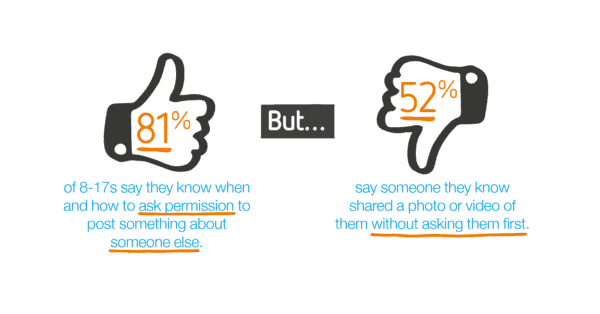Safer Internet Day 2019: Together for a better internet
The research comes as more than 2000 supporters in the UK, including Government ministers, Premier League football clubs, industry bodies, celebrities, charities, schools and police services join together with young people, to inspire people throughout the UK to ignite conversations and host Safer Internet Day events that help promote the safe, responsible and positive use of digital technology for children and young people.
The Internet helps young people make sense of the world around them
In an increasingly digitised world, with young people sharing a variety of content every day, 65% say they would feel disconnected from the world if they couldn’t be online. Helping them to make sense of their daily lives and wider society, 70% of young people say being online helps them understand what’s happening in the world and 60% only know about certain issues or news because of the internet.
Crucially, young people are using the internet as a safe space to understand and navigate topics they’re nervous to ask about, with 67% saying it’s easier to learn about them online. Encouragingly, the internet has helped almost half (46%) through a difficult time.
With technology enabling us to connect and learn faster than ever, 48% of young people say being online makes them feel like their voices and actions matter. Maximising on the collective power of the internet, 42% have been inspired to take positive action by sharing support for a campaign, social movement or petition.
84% young believe they have a responsibility to respect other online
However, the myriad of ways in which young people connect online means they must also navigate the complexities of asking for and giving permission before sharing. Young people have a strong sense of right and wrong online, with an overwhelming 84% believing everyone has a responsibility to respect others. However, in practice almost half (48%) admit their peers don’t always think before they post. 36% of young people are sharing screenshots of other peoples’ photos, comments or messages at least weekly.
This exposes young people to a confusing landscape when it comes to online consent, and a lack of consensus on how to navigate this. Half of young people (51%) think their friends should ask for permission before tagging them or sharing a photo or video of them, while 37% think their parents should ask. Furthermore, 27% are likely to read a friend’s messages without their permission.
Young people are also not asking permission before posting, despite 81% knowing when and how to ask. Consequently, in the last year over half of young people (52%) said someone they know shared a photo or video of them without asking.
Impact of breach of consent on young people
This breach of consent can leave young people feeling anxious or not in control (39%), with a lack of clarity clearly having a real impact on their lives.
Even when permission is sought, young people are facing further pressures. Despite feeling confident telling their friends (82%) and parents (85%) not to share something about them online, in practice it can be difficult to say no. In the last year, 34% have said yes to something about them being shared online, even though they didn’t want it to be.
The ‘rules’ are also confused when consent is breached. Whilst the majority of young people would always remove something they’d posted about a friend if asked to, 36% would not. Encouragingly, young people do rally against injustices they see online and 68% would report something that had been shared about them without permission. 63% would report if it happened to a friend.
Will Gardner OBE, Director of the UK Safer Internet Centre, says:
“There can be no doubt that sharing and connecting with others online is an integral part of everyday life for young people. Today’s findings are encouraging, highlighting how young people have a strong sense of what is right online, and are harnessing the internet to make a positive difference for themselves and others.
“However, our research shows that without clear guidance for navigating the complexities of online consent, the gap between young people’s attitudes and behaviours is striking.
Education Secretary Damian Hinds said:
“We must provide children with the skills to use technology and take advantage of the online world effectively and safely. We are making Relationships Education compulsory in all primary schools and Relationships and Sex Education compulsory in all secondary schools, to sit alongside the existing Computing curriculum. Teachers will address online safety and appropriate behaviour in a way that is relevant to pupils’ lives.
Home Secretary Sajid Javid said:
“The Government is committed to keeping children safe online. We are working closely with the technology industry to make the internet a safer and more responsible place.”
“All children will be taught about online friendships as well as to face-to-face relationships. I want children to understand that the same rules of good behaviour and kindness that they are taught in the playground also apply online.”





